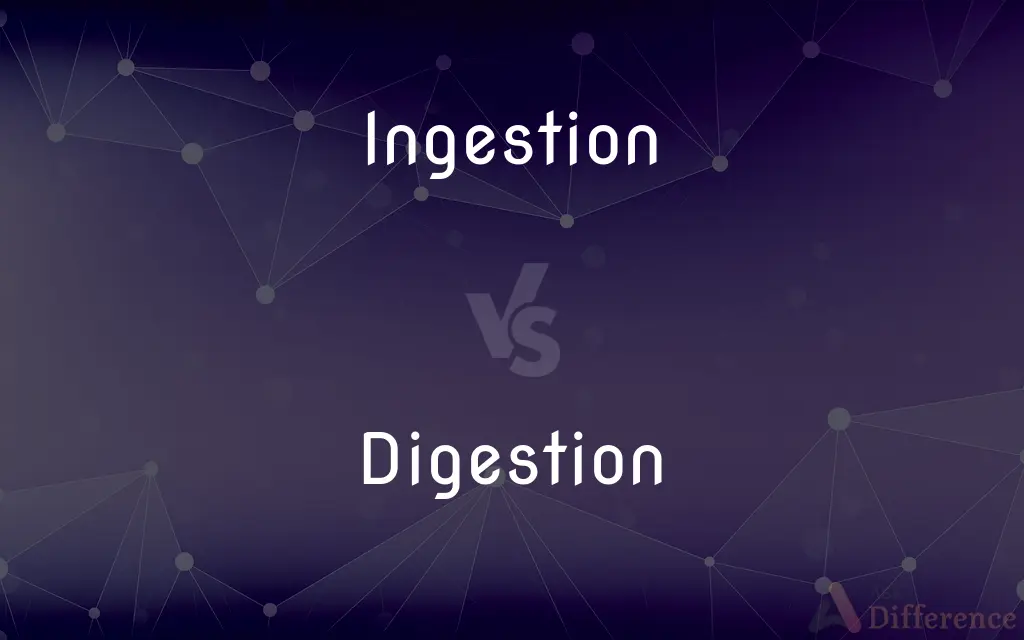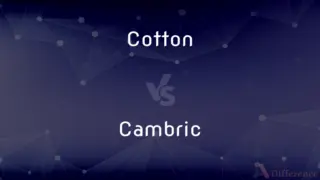Ingestion vs. Digestion — What's the Difference?
Edited by Tayyaba Rehman — By Fiza Rafique — Updated on September 25, 2023
Ingestion is the process of taking food or substances into the body through the mouth. Digestion is the process of breaking down food into simpler substances that can be absorbed and used by the body.

Difference Between Ingestion and Digestion
Table of Contents
ADVERTISEMENT
Key Differences
Ingestion primarily occurs in the mouth.Digestion occurs mainly in the stomach and small intestine.
Ingestion initiates the food intake process. Digestion involves the chemical and mechanical breakdown of food for nutrient absorption.
Ingestion is a relatively quick process. Digestion can take several hours, depending on the complexity of the food.
Ingestion results in the presence of food in the stomach. Digestion results in the transformation of food into nutrients that can be absorbed into the bloodstream.
Comparison Chart
Meaning
Taking food into the mouth
Breaking down food for nutrient absorption
ADVERTISEMENT
Location
Mainly in the mouth
Occurs in the stomach and small intestine
Purpose
Initiates food intake
Converts food into absorbable nutrients
Duration
A relatively quick process
Can take several hours for complex foods
Outcome
Presence of food in the stomach
Transformation of food into usable nutrients
Compare with Definitions
Ingestion
The process of introducing nutrients into the digestive system.
The first step in digestion is the ingestion of food.
Digestion
The chemical and mechanical breakdown of ingested food.
Digestion in the small intestine allows nutrient absorption.
Ingestion
The initial step in the digestive process.
Ingestion occurs when you sip a glass of water.
Digestion
The critical step in extracting energy from food.
Digestion of carbohydrates yields glucose for energy.
Ingestion
Taking substances into the body through the mouth.
Ingestion of medication should be done as directed by a doctor.
Digestion
The conversion of complex food molecules into simpler forms.
Digestion in the gut enables nutrient extraction.
Ingestion
The act of consuming food by chewing and swallowing.
Ingestion begins when you take a bite of an apple.
Digestion
The process that prepares nutrients for absorption into the bloodstream.
Digestion of proteins produces amino acids for the body.
Ingestion
The action of bringing food into the digestive tract.
Ingestion of nutrients is essential for nourishment.
Digestion
Digestion is the breakdown of large insoluble food molecules into small water-soluble food molecules so that they can be absorbed into the watery blood plasma. In certain organisms, these smaller substances are absorbed through the small intestine into the blood stream.
Ingestion
Ingestion is the consumption of a substance by an organism. In animals, it normally is accomplished by taking in a substance through the mouth into the gastrointestinal tract, such as through eating or drinking.
Digestion
The process by which food is converted into substances that can be absorbed and assimilated by a living organism. In most animals it is accomplished in the digestive tract by the mechanical and enzymatic breakdown of foods into simpler chemical compounds.
Ingestion
To take into the body by the mouth for digestion or absorption.
Digestion
The ability to digest food.
Ingestion
To take in and absorb as food
"Marine ciliates ... can be observed ... ingesting other single-celled creatures and harvesting their chloroplasts" (Carol Kaesuk Yoon).
Digestion
(Biochemistry) The process of decomposing complex organic substances into simpler substances, as by the action of enzymes or bacteria.
Ingestion
The action of ingesting, or consuming something orally, whether it be food, drink, medicine, or other substance. It is usually referred to as the first step of digestion.
Digestion
(Chemistry) The process of softening or disintegrating by means of chemical action, heat, or moisture.
Ingestion
(by extension) The act of ingesting something into a jet engine.
Digestion
Assimilation of ideas or information; understanding.
Ingestion
The act of taking or putting into the stomach; as, the ingestion of milk or other food.
Digestion
The process, in the gastrointestinal tract, by which food is converted into substances that can be utilized by the body.
Ingestion
The process of taking food into the body through the mouth (as by eating)
Digestion
The result of this process.
Digestion
The ability to use this process.
Digestion
The processing of decay in organic matter assisted by microorganisms.
Digestion
The assimilation and understanding of ideas.
Digestion
Generation of pus; suppuration.
Digestion
(chemistry) Dissolution of a sample into a solution by means of adding acid and heat.
Digestion
The act or process of digesting; reduction to order; classification; thoughtful consideration.
Digestion
The conversion of food, in the stomach and intestines, into soluble and diffusible products, capable of being absorbed by the blood.
Digestion
Generation of pus; suppuration.
Digestion
The process of decomposing organic matter (as in sewage) by bacteria or by chemical action or heat
Digestion
The organic process by which food is converted into substances that can be absorbed into the body
Digestion
Learning and coming to understand ideas and information;
His appetite for facts was better than his digestion
Digestion
The process of breaking down food into nutrients.
Digestion in the stomach involves acid and enzymes.
Common Curiosities
How does the duration of ingestion compare to that of digestion?
Ingestion is a relatively quick process, while digestion can take several hours, especially for complex foods.
What is chemical digestion, and where does it occur?
Chemical digestion involves the action of enzymes and acids to break down food. It primarily occurs in the stomach and small intestine.
What happens to food during digestion?
During digestion, food is broken down into smaller molecules, including proteins, carbohydrates, and fats, to enable absorption and use by the body.
Can you provide an example of mechanical digestion in the digestive process?
Chewing food in the mouth is an example of mechanical digestion, as it breaks down food into smaller pieces.
Is ingestion the same as absorption?
No, ingestion is the act of taking food into the mouth, while absorption refers to the process of nutrients entering the bloodstream.
What role do enzymes play in digestion?
Enzymes are crucial in breaking down food molecules into smaller, more absorbable forms during digestion.
What is the primary purpose of ingestion in the digestive process?
Ingestion initiates the intake of food into the digestive system, starting with the mouth.
What is the significance of digestion in the body?
Digestion is essential because it converts food into nutrients that can be absorbed and used for energy and bodily functions.
Where does digestion primarily occur in the digestive tract?
Digestion mainly occurs in the stomach and the small intestine, where food is broken down into simpler substances.
What is the ultimate outcome of the digestion process?
The ultimate outcome of digestion is the conversion of food into nutrients that can be absorbed into the bloodstream and utilized by the body's cells.
How does digestion transform carbohydrates into usable energy for the body?
Digestion of carbohydrates converts them into glucose, which is absorbed into the bloodstream and used as an energy source.
Why is proper digestion crucial for overall health?
Proper digestion ensures that the body receives essential nutrients for growth, energy, and maintenance of bodily functions.
Are there specific enzymes responsible for digesting different types of nutrients?
Yes, various enzymes in the digestive system are specialized in breaking down proteins, carbohydrates, and fats.
Can ingestion occur without digestion following it?
Ingestion typically precedes digestion, as the digestive process starts in the mouth with chewing and saliva mixing with food.
How does the body absorb the nutrients produced during digestion?
Nutrients produced during digestion are absorbed through the walls of the small intestine into the bloodstream, where they are transported to cells throughout the body.
Share Your Discovery

Previous Comparison
Cotton vs. Cambric
Next Comparison
CST vs. ISTAuthor Spotlight
Written by
Fiza RafiqueFiza Rafique is a skilled content writer at AskDifference.com, where she meticulously refines and enhances written pieces. Drawing from her vast editorial expertise, Fiza ensures clarity, accuracy, and precision in every article. Passionate about language, she continually seeks to elevate the quality of content for readers worldwide.
Edited by
Tayyaba RehmanTayyaba Rehman is a distinguished writer, currently serving as a primary contributor to askdifference.com. As a researcher in semantics and etymology, Tayyaba's passion for the complexity of languages and their distinctions has found a perfect home on the platform. Tayyaba delves into the intricacies of language, distinguishing between commonly confused words and phrases, thereby providing clarity for readers worldwide.
















































